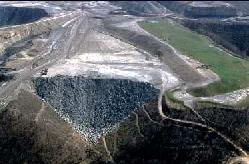
|


|

|
| This page is Bobby
Worldwide Approved for Section 508. |
|
 |
 |
 |

Haden Fill Ruling Right, Group
Says
KEN WARD, JR.
The Charleston Gazette (W. Va.)
September 25, 2002
 Valley fills have scarred the
landscape and buried more than 500 miles of Appalachian
mountain streams. Photo
courtesy of U.S. News & World Report.
Valley fills have scarred the
landscape and buried more than 500 miles of Appalachian
mountain streams. Photo
courtesy of U.S. News & World Report. |
A federal judge was right to
generally ban coal operators from burying streams with waste rock
and dirt, a citizens group has told an appeals court.
Lawyers for the group Kentuckians
For The Commonwealth agreed with Chief U.S. District Judge
Charles H. Haden II that the Clean Water Act prohibits most valley
fills.
In a legal brief, the citizen lawyers said that valley fills violate
water quality standards and contradict "the central
objective" of the Clean
Water Act.
"It is undisputed that valley fills have already destroyed the
physical integrity of over 500 miles of streams by burying them
under millions of tons of mining waste," they said.
"The basic objective and policy of the CWA is to restore,
maintain and enhance water quality, to prevent degradation of
existing uses, and to prohibit designating waters as waste
dumps," they said. "As Judge Haden stated, Congress 'did
not ... authorize cheap waste disposal when it
passed the Clean Water Act.' "
Late Monday, Kentuckians For The Commonwealth filed their 56-page
brief with the 4th U.S. Circuit Court of Appeals in Richmond, Va.
Lawyers for the citizen group are defending a May 8 ruling by Haden.
The Bush administration and the coal industry are appealing Haden's
decision. They allege that Haden misread the Clean Water Act, and
that Haden went too far in issuing an order to block new valley
fills.
In the case, the citizens are represented by Joe Lovett of the
Appalachian Center for the Economy and the Environment, Jim Hecker
of Trial Lawyers for Public Justice
and Lexington lawyer Joe Childers.
In his May 8
opinion, Haden ruled that the Clean Water Act generally
prohibits coal operators from burying streams with waste rock and
dirt from mountaintop removal mining.
Haden said that valley fills may only be permitted when coal
operators propose them as part of a post-mining development plan.
In his decision, Haden traced the legislative history of the Clean
Water Act and an earlier law, the Rivers and Harbors Act of 1899.
Haden said that history, including remarks by lawmakers, clearly
shows that Congress did not intend to allow waste piles to bury
streams.
In their appeal brief, citizen group lawyers agreed that fills
violate the law. But they said that they reached that conclusion
"on grounds that differ, in part, from those relied on by the
district court."
Rather than tracing legal history, the citizen group lawyers
outlined two key Clean Water Act standards that they said valley
fills violate.
One is the "waste
assimilation" standard, which says that rivers and streams
are not to be used for waste disposal.
"Valley fills that bury waters of the United States with
millions of tons of waste cannot achieve this water quality
standard," the citizen group lawyers said. "As Judge Haden
has stated, 'valley fills are waste disposal projects so enormous
that, rather than the stream assimilating the waste, the waste
assimilates the stream.' "
The other is the antidegradation standard, which says that existing
uses of streams and existing water quality must not be diminished.
This standard, the citizen lawyers said, "cannot be reconciled
with the continued filling of hundreds of miles of streams with
mining waste."
The citizen lawyers also said that a new Clean Water Act regulation,
issued by the corps and the U.S. Environmental Protection
Agency,
aimed at legalizing fills does not match the goals of the law.
"The corps' interpretation is also illegal because it has no
limiting principal," they said.
"It opens the door to the designation of an unlimited length of
rivers and streams for waste assimilation, whether it is 500 miles
or 5,000 miles," they said.
"It is hard to imagine a result more inconsistent with the
CWA's purpose and its 'central' water quality standards
requirement."
Both sides have asked the 4th Circuit to hear oral arguments. No
date for that had been scheduled as of Tuesday.
To contact staff writer Ken Ward, Jr., use
e-mail or call 304-348-1702.
|
 |
 |
![]()